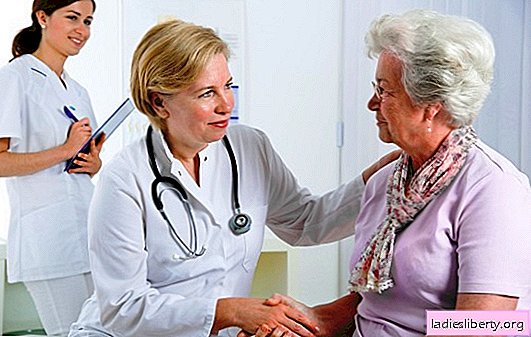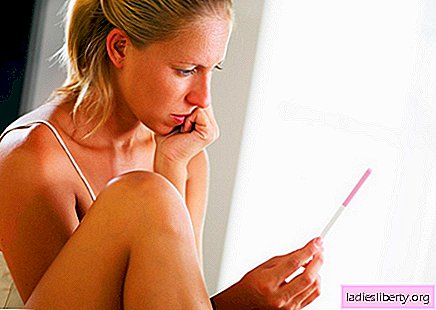
Hypothyroidism is a thyroid disease that develops due to a lack of necessary hormones.
This disease is considered very dangerous, as it can lead to serious malfunctions in the body.
Let us consider in more detail the symptoms of hypothyroidism in women and methods of treating such an ailment.
Hypothyroidism in women: causes
Hypothyroidism is primary and secondary.
The primary form of the disease develops for the following reasons:
1. Reduction of thyroid tissue after surgery.
2. Violation of the production of thyroid hormones after prolonged treatment with antiviral drugs for hepatitis B or C. Also, treatment with iodine preparations and taking drugs can lead to this.
3. Malfunctions in the production of hormones due to the intake of sex hormones or certain medications (prednisone, dopamine).
4. Iodine deficiency in the body.
5. Various genetic defects.
6. Congenital malformations of the thyroid gland.
A secondary form of hypothyroidism can occur for the following reasons:
1. Infections in the brain (neuroinfection).
2. Heavy bleeding.
3. Oncological formations of the pituitary gland.
4. Severe nervous strain and stress.
5. Brain injuries (concussion).
6. The presence of inflammatory processes in the thyroid gland.
Hypothyroidism in women: symptoms and signs
Features of the manifestation of hypothyroidism in women are:
1. General symptoms are very similar to the manifestations of various somatic as well as mental illnesses, which is why hypothyroidism is difficult to detect only on the basis of the patient’s history.
2. There is no direct dependence on a lack of thyroid hormones and symptoms. That is, the patient may not be very pronounced some manifestations of the disease.
3. Symptoms of hypothyroidism can be very different. Clinical manifestations largely depend on the age of the patient, the cause of the disease, as well as the rate of development of the pathology.
4. Symptoms of hypothyroidism can manifest itself in the form of disorders in one or several body systems. It is also purely individual and depends on the degree of neglect of the pathology (for this reason it is sometimes very difficult to detect hypothyroidism, because the disease can indicate completely different malfunctions in the body).
5. Moderate hypothyroidism may not be felt at all for a long time. Thus, a person will not even suspect that he is sick.
Hypothyroidism in different forms has the following flow characteristics and symptoms:
1. With prolonged and advanced hypothyroidism, the patient has severe swelling of the face and limbs. The skin becomes yellowish, the eyelids swell. This is due to the strong fluid retention in the body.
2. Often there is aches in the body, muscle and joint pain. A woman feels severe weakness in her arms and legs. Dramatically lost performance.
3. The skin begins to lose moisture. Peeling appears. Nails also often suffer - they become brittle and thin. The same thing happens with hair - they lose their luster and thin.
4. Patients with severe hypothyroidism observe a change in voice. It can become lower with the appearance of hoarseness. There may also be a hearing impairment (happens due to laryngeal edema).
5. Some patients may experience apathy, lethargy, impaired memory, concentration and attention. There is a development of depression, loss of interest in life.
6. Due to metabolic disorders, a woman can dramatically gain weight. Hypothermia and malfunctions in blood pressure will also be observed.
7. Complaints of drowsiness during the day and a complete lack of desire to fall asleep in the evening (insomnia) are characteristic.
8. Very often, women experience serious malfunctions in the reproductive system. In this case, the menstrual cycle may be disturbed, sexual desire may decrease and uterine bleeding may occur. In more advanced cases, infertility and mastopathy develop.
It is important to indicate that a lack of a hormone in some cases does not prevent pregnancy, but in this condition a woman has a high risk of abortion or the birth of a child with significant disorders in the functioning of the nervous system.
With prolonged course of hypothyroidism, the formation of adenoma is possible.
In the acute course of hypothyroidism in a woman, the following additional symptoms may appear:
1. Tearfulness.
2. Poor cold tolerance (a condition where a person cannot warm up).
3. Paresthesia.
4. The appearance of excessive dryness of the skin in the area of the knees and elbows.
5. Peeling of the skin, even when using moisturizers.
6. Morning swelling of the face.
7. The development of atherosclerosis.
8. metabolic disorders.
9. Anemia.
10. Decrease in appetite.
11. Shortness of breath.
12. Nausea.
13. The appearance of increased sweating.
14. Increased heart rate (arrhythmia, bradycardia).
15. Failures in the menstrual cycle.
16. Headaches.
17. Increase in cholesterol.
18. Flatulence, constipation and indigestion.
Hypothyroidism in women: treatment
Traditional therapy for hypothyroidism in women involves the appointment of such groups of drugs:
1. Medicines containing iodine (Iodomarin).
2. The appointment of drugs to normalize the menstrual cycle in women.
3. Preparations for the normalization of metabolism in the brain (a group of neuroprotectors).
4. Vitamins (Aevit, Tocopherol).
5. When detecting heart failure, glycosides (Digoxin, Strofantin) can be used. Cardioprotectors (Riboxin, ATP, Preducal) are also often prescribed.
6. Mandatory in such therapy is the appointment of hormone-containing drugs. The most commonly used thyroxine or triiodothyronine. Eutirox or Bagothyrox are less commonly prescribed.
In the treatment of hormones, the patient may be offered several courses and types of therapy. In some cases, a woman will be advised to take such drugs for life, in others - only for a certain time.
The duration of treatment is selected individually depending on the cause of the disease and the results of the tests.
Hypothyroidism in women: features of treatment and prevention
It is very important to follow a diet in the treatment of hypothyroidism. Such medical nutrition has the following rules:
1. Food should be consumed exclusively in boiled form. You will have to give up fried for a long time.
2. Limit the use of fatty and spicy foods. You also need to give up salt and sugar.
3. The menu should be well balanced and full. Best if the dishes are easily digestible. You can consult a nutritionist, gastroenterologist, or endocrinologist to help you make a diet.
4. Do not eat eggs, butter, lard and pickles.
5. Small amounts of fish and meat are allowed. At the same time, you can eat porridges and soups with vegetables daily.
6. It is good to eat foods with a high iodine content (seaweed).
7. The liquid can be consumed, but not at night, so as not to cause swelling.
8. For digestive disorders, eat small meals.
In addition to the diet, patients with hypothyroidism need vitamin therapy. Usually, vitamins of group B, vitamin A, B and C are prescribed.
Hypothyroidism is a serious pathology that requires a long complex treatment. In the absence of timely therapy, the patient may develop the following complications:
1. Hypothyroid coma is one of the most dangerous complications that develops with prolonged hypothyroidism.
2. Disturbances in the central nervous system (confusion).
3. Ischemic stroke.
4. Heart attack.
5. Atherosclerosis of cerebral vessels.
6. A strong decrease in immunity, which can lead to cancer.
7. Serious disruptions in the female reproductive system (infertility, sexual dysfunction).
In order to prevent the development of hypothyroidism, it is important to adhere to such doctor's recommendations:
1. Twice a year to undergo a control examination for the level of thyroid hormones.
2. When the first signs of hypothyroidism appear, immediately consult a doctor and do not start your condition.
3. Enrich your diet with products containing iodine.
4. Avoid strong emotional stress and stress.
5. In no case do not take hormone-containing drugs without a doctor's prescription.











